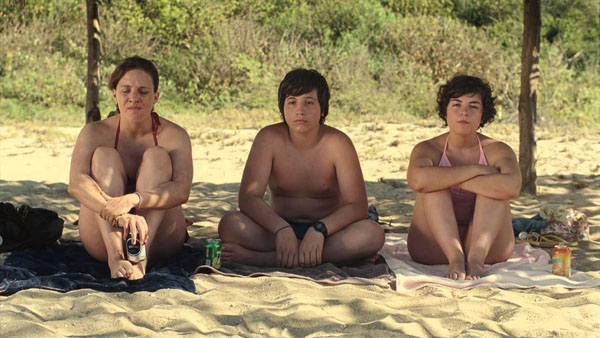Fernando Eimbcke is one of two filmmakers being spotlighted in the New York Film Festival’s Emerging Artists program (the other being Joanna Hogg). Following screenings of Duck Season (2004) and Lake Tahoe (2008), Eimbcke’s latest, Club Sandwich, featured in Toronto‘s Contemporary World Cinema program last month, screens this afternoon.
“Eimbcke should be better-known in America,” argues Simon Abrams at RogerEbert.com, “but he isn’t since Duck Season, his first film to be released in the States, was released with producer Alfonso Cuarón’s seal of approval under Warner Bros.’ defunct Esperanto Pictures label. The film was the first and last title released by Esperanto Pictures. This is not a reflection on the quality of that film but the fact that it was such a difficult film to sell: a deadpan black-and-white comedy about horny and desperately lonely Mexican teenagers? Who wants to see that? Well, you, that’s who.”
In 2009, Aaron Hillis reviewed Lake Tahoe for the Voice: “Coming down from the Saturday sugar rush of his 2006 comedy Duck Season, Mexican auteur Fernando Eimbcke’s lovely, Yucatán-set dramedy drifts by on a similar deadpan wave of static vignettes and lingering pauses that must be 10 months pregnant. Eimbcke’s droll rhythms are reminiscent of early Jim Jarmusch and Aki Kaurismäki—here stylistically appropriate for a film about social and emotional inertia.”
Variety‘s Justin Chang sets up Club Sandwich: “Taking advantage of cheap lodging rates during the ‘low season,’ single mother Paloma (Maria Renee Prudencio) and her son, Hector (Lucio Gimenez Cacho), appear to have perfected the art of doing nada on their time off. Paloma listens to music through earphones; once in a while, Hector orders a club sandwich. Mom notices that Hector, aka ‘Honey Bun,’ is starting to grow a mustache, and advises him not to shave because the peach fuzz will only grow back thicker—a concise illustration of Paloma’s wish to extend the kid’s innocence for as long as possible. Alas, Hector’s modest sexual awakening comes in the form of Jazmin (Danae Reynaud Romero), a slightly older girl who’s staying at the hotel with her dad. Mostly the kids sit together and stare awkwardly into space; at one point, Jazmin gives Hector a gift—a fresh container of deodorant. Paloma initially attempts to interrupt their idyllic meetings, but gradually comes to the point where she’s even facilitating the kids’ private time away from parents.”
“Hector’s puberty blues are handled with a light touch that’s frank but delicate,” writes David Rooney in the Hollywood Reporter. “‘Are you listening to Prince?’ he asks his mother, over the buzz of her earphones. ‘Why do you like him?’ ‘He’s a great musician, and he’s sexy,’ she replies. ‘Am I sexy?’ asks Hector. ‘Sure, in your own way,’ says Paloma. The ease and openness of their bond is sketched with lovely economy, both in the writing and in the unaffected performances.”
“The movie’s masterstroke,” writes Mike D’Angelo at the Dissolve, “is the way it gradually shifts perspective, becoming the rare coming-of-age story told from a parent’s increasingly melancholy (yet at the same time accepting and proud) point of view. In this familiar context, the change in emphasis achieves a seismic force.”
Carson Lund at In Review Online: “The director’s formal strategy is to suck the film dry of any expressive gestures, preferring to stare stoically as his characters lounge about with little to do or say, the rhythmic hum of an oscillating fan or a droning air conditioner providing the only soundtrack. This blankness is coupled with an editing approach driven by punch lines, whereby the associations between Eimbcke’s nondescript shot setups draw comic connective tissue. Images without dynamism or organic movement gain significance when placed alongside each other, which is a tactic that comes perilously close to rendering the characters contained within the shots mere concepts, their dramas little more than static ideas. None of which is to say that Club Sandwich isn’t funny or that its ideas aren’t worthwhile; it’s just that it feels a bit too precise, too convinced of its own effects.”
It works for Screen‘s Mark Adams, who finds that “Eimbcke’s charming film is both poignant and laugh-out-loud funny.”
NYFF 2013 Index. For news and tips throughout the day every day, follow @KeyframeDaily on Twitter and/or the RSS feed. Get Keyframe Daily in your inbox by signing in at fandor.com/daily.





